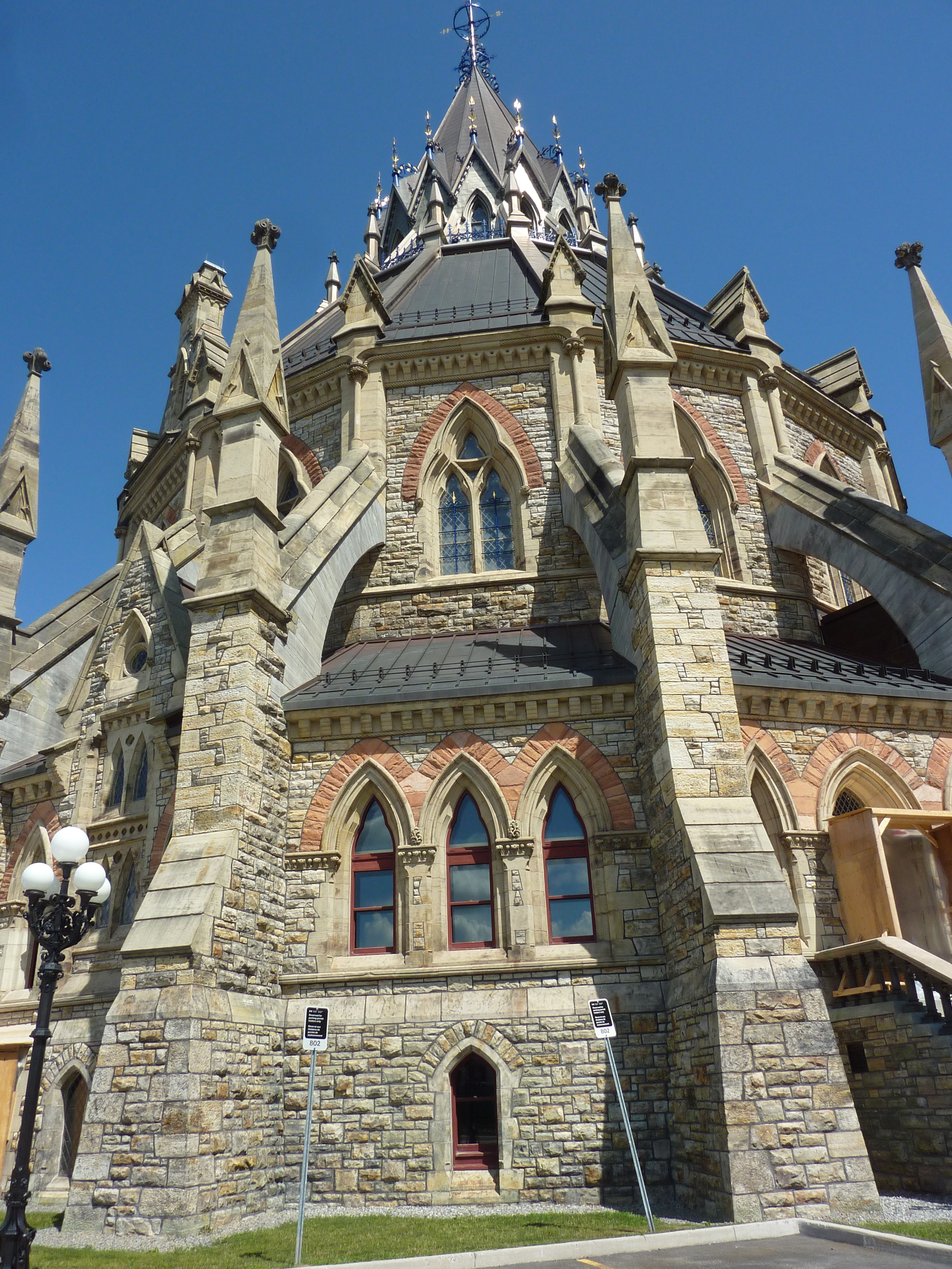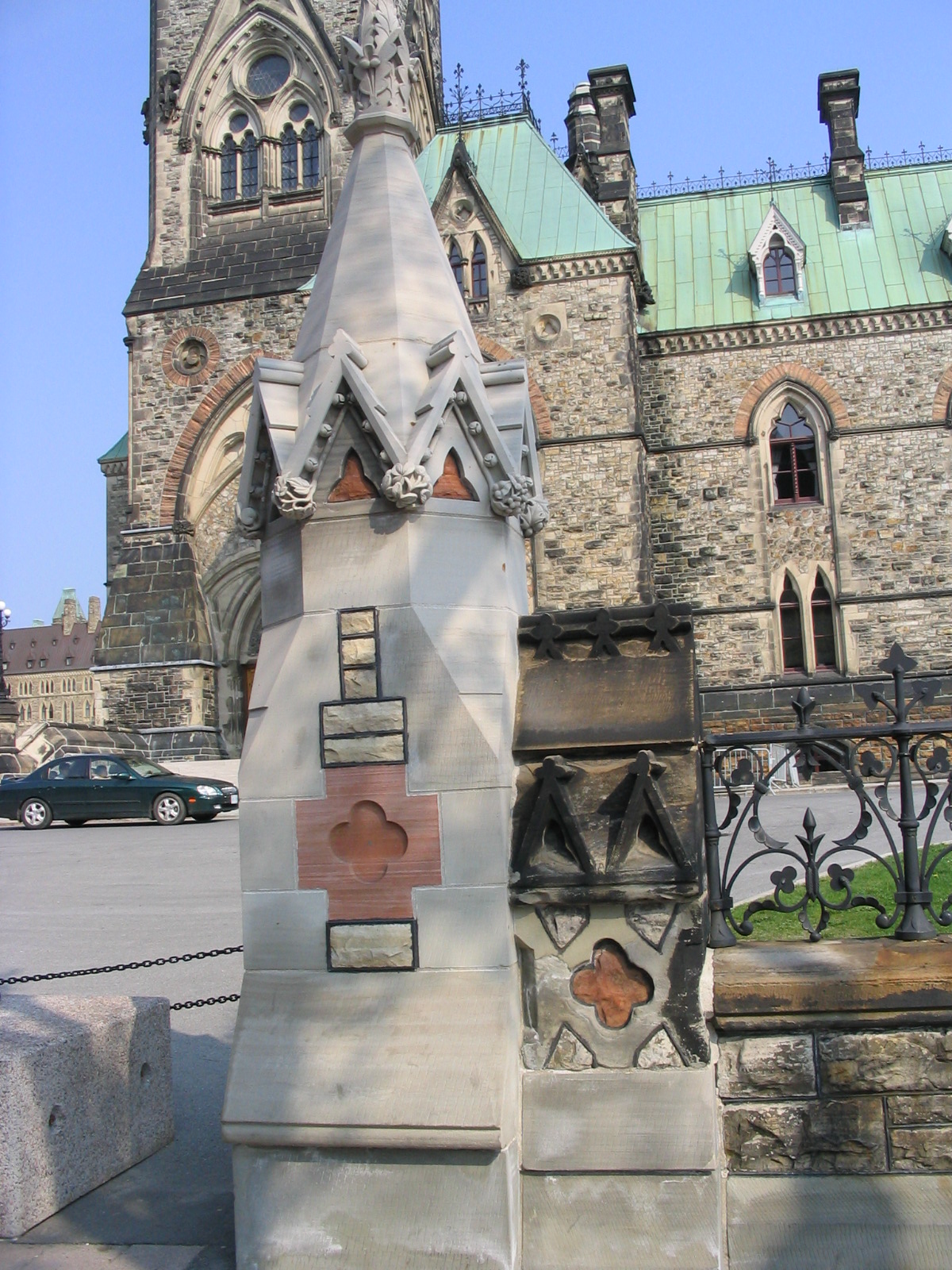24. Building Stones and Monuments of Downtown Ottawa
A walking tour of the geology of Ottawa's buildings and monuments
Downtown Ottawa
Parliament building
Photo by Q. Gall.
A variety of rocks have been used as building stone in downtown Ottawa. Next time you're downtown or in the Market area, look at the following buildings from a geological perspective.
Many more buildings are described in an excellent guidebook to the geology of the buildings of Ottawa, "A walking guide - Ottawa's building and monument stones" by Quentin Gall, available from the bookstore of the Geological Survey of Canada.
BUILDINGS AND GEOLOGY
- Parliament Buildings: Nepean Sandstone, Potsdam sandstone, Wallace Sandstone, Ohio Sandstone, Tyndall Limestone, Ottawa Limestone, Missisquoi Black Marble (actually limestone), Stanstead Granite, Grenville Marble, Tennessee Marble
- Paving stones around Centennial Flame: Tadoussac Granite Gneiss
- Entrance to stairs descending to locks, Wellington St.: Deschambeault Limestone
- Chateau Laurier and Old Union Station (Conference Centre), 1 & 2 Rideau St.: Granite, Indiana Limestone
- British High Commission, 80 Elgin St.: Baltic Rapakivi Granite (ovoid feldspars with halos), black Norwegian Anorthosite
- Lord Elgin Hotel, 100 Elgin St.: Deschambeault Limestone
- Hope Building, 61-63 Sparks St.: Stanstead Granite and Italian Marble
- E.R. Fisher Building, 117 Sparks St.: Serpentine Marble
- TD Bank, 212 Sparks St.: Queenston limestone
- Scotia Bank, 118 Sparks St.: Adair Marble
- Bank of Montreal, 161 Sparks St.: Queenston Limestone, Stanstead Granite, Floor tiles of Cararra Marble. Mexican Onyx (Travertine)
- The Shoe Box, Le Papillon, 189 Sparks St.: Lac St. Jean Anorthosite
- Hallmark, 203 Sparks St.: Serpentinite
- Wellington Building, 180 Wellington St.: base of Stanstead Granite, faced with Indiana Limestone
- National Press Club, 150 Wellington St.: Indiana Limestone
- Langevin Block, 50 Wellington St.: Miramichi sandstone
DIMENSION STONES COMMONLY USED IN THE OTTAWA-GATINEAU REGION INCLUDE:
- Nepean Sandstone (Cambro-Ordovician, Kanata)
- Potsdam Sandstone (Cambro-Ordovician, Kingston, New York State)
- Wallace Sandstone (Carboniferous, Nova Scotia)
- Old Red Sandstone (Devonian, Scotland)
- Ohio Sandstone (Berea Formation, Mississippian, Wakeman, Ohio)
- Tyndall Dolomitic Limestone (Ordovician, Garson, Manitoba: contains Receptaculites, Maclurites, other gastropods, burrows, orthocones, and corals)
- Ottawa Limestone (Ordovician, local)
- Cobourg Limestone (Ordovician, local)
- Adair Marble (actually dolostone: Amabel Formation - Silurian, Wiarton, Ontario)
- Eramosa Dolostone (Silurian, Wiarton, Ontario; stromatolitic; used mainly as "Waterfall Rock" in landscaping)
- Queenston Limestone (Niagara)
- Deschambault Limestone (Lowville, Quebec)
- Missisquoi Black Marble (actually limestone, Philipsburg, Quebec)
- Indiana or Salem Limestone (Mississippian, Bedford, Indiana: main source of dimension stone in USA)
- Tennessee Marble (Knoxville, Tennessee)
- Italian Marble, Carrara Marble
- Mexican Onyx (travertine)
- Tadoussac granite gneiss (Precambrian, Saguenay, Quebec)
- Stanstead Granite (Beebe, Quebec)
- Vermillion Bay Granite
- Lac St. Jean Granite
- Standstead Granite
- Peribonka Granite (actually gabbro, Lac St. Jean)
- Tadoussac Granite Gneiss
- Rapakivi Granite ("Baltic Brown", Finland)
- Labradorite Anorthosite ("Norwegian Blue Pearl")
- Larvakite (Labradorite Syenite)
- Serpentinite
- Vermont Slate
- Verde Antique (Roxbury, Vermont


